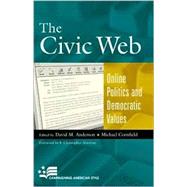
| Foreword | p. vii |
| Acknowledgments | p. xi |
| Introduction | p. 1 |
| The Internet and Politics: Framing the Issues | |
| Reflections on Campaign Politics, the Internet, and Ethics | p. 9 |
| Cautious Optimism about Online Politics and Citizenship | p. 19 |
| If Political Fragmentation Is the Problem, Is the Internet the Solution? | p. 35 |
| The Current State of Online Politics | |
| Online Campaigning and the Public Interest | p. 47 |
| Election Law and the Internet | p. 63 |
| Digital Grass Roots: Issue Advocacy in the Age of the Internet | p. 77 |
| Citizen Participation and the Internet | |
| Adding in the Net: Making Citizenship Count in the Digital Age | p. 97 |
| Civic Participation and Technology Inequality: The "Killer Application" Is Education | p. 113 |
| The Internet and an Informed Citizenry | p. 129 |
| The Internet, Democracy, and the Future | |
| E-Democracy: Lessons from Minnesota | p. 157 |
| The Internet and Dreams of Democratic Renewal | p. 167 |
| The Politics of a Network World: A Speculation | p. 185 |
| List of Key Web Sites Cited | p. 203 |
| Index | p. 205 |
| About the Contributors | p. 217 |
| Table of Contents provided by Syndetics. All Rights Reserved. |
The New copy of this book will include any supplemental materials advertised. Please check the title of the book to determine if it should include any access cards, study guides, lab manuals, CDs, etc.
The Used, Rental and eBook copies of this book are not guaranteed to include any supplemental materials. Typically, only the book itself is included. This is true even if the title states it includes any access cards, study guides, lab manuals, CDs, etc.